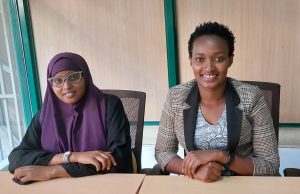Today, March 8, it’s International Women’s Day, and the theme of this year is #BreakTheBias. We are proud to cooperate with many amazing women who drive change in their communities, challenge stereotypes and, indeed, break the bias in the water and sanitation sector. Elsie Too and Fartun Ibrahim work in the finance for water, sanitation and hygiene (WASH) sector in Kenya. We interviewed them about their experience with fighting biases and asked them to tell us about their work:
Elsie: I am a junior consultant at Aqua for All based in Kenya. I support collaboration with financial institutions in Kenya, specifically on monitoring, reporting, and learning. Currently, these institutions are The National Bank of Kenya (NBK) and Sidian Bank.
Fartun: I am a monitoring and evaluation officer for the WASH programme at NBK. I am responsible for performing monitoring and evaluation tasks, operations using the M&E framework and tools, reporting on WASH finance and maintaining a portfolio for the programme.

— Can you explain why you choose finance for WASH?
Elsie: My decision to engage in WASH finance was initially driven by my master project – it was focused on finance in the health sector. Given my previous experience in WASH, I received the opportunity to work in my current position. So it was a combination of my deep interest and experience in the sector that led me here.
Fartun: The WASH programme was new to the bank, and I found it interesting. Working on it allowed me not only to generate revenue for the bank but also be a part of the division that can make a real impact on Kenyan communities.
— What do you like the most about your work?
Elsie: Working at Aqua for All has been a very rewarding experience. What I like the most is using disruptive financial instruments that are anchored on sustainability to transform the WASH sector. Aqua for All is focused on innovation and scalability, which shifts the whole perspective in the WASH sector away from direct grants. It tackles the financial aspect of WASH while making sure that the supported businesses are sustainable for the years to come.
Fartun: I am happy that I can promote investments in the WASH sector and help my institution to achieve hard-to-attain impact. This is my contribution to SDG 6 – providing clean and safe water to the communities. Being a changemaker within my community and within my institution is what truly motivates me in my job.
— #BreakTheBias is the theme of this year’s International Women’s Day. What, as you think, are some of the biases in the WASH sector that urgently need to be broken?
Elsie: WASH finance is male-dominated. For example, in the financial institutions that we are working with, 99% of those involved in the design of WASH products are men. I am determined to break these biases using the experience that I got at Aqua for All. I am seeking to create a pool of competent women in the WASH finance sector by mentoring aspiring female professionals.
— How do you #BreakTheBias yourself?
Elsie: For me, it is mostly about mentoring other women in my field. As finance for WASH in the banking sector is not yet fully developed in Kenya, it is crucial to have women who contribute to decision making and co-creation processes. We must also make sure that WASH services reach women in various parts of the country. That is what we are currently working on with Fartun, who will then transfer her skills to other women in the banking sector.
Fartun: I am following in Elsie’s steps, and not only by mentoring women in the finance sector. We can motivate those women who just finished school to study finance and WASH in universities. We can also encourage women to start their own businesses in this sector.
— What would you say to other young women who want to #BreakTheBias and pursue a career in finance for WASH?
Elsie: Align your interests with your main goal, find what you really want to do in life as a woman. You can do it! Just find mentors, not a single person but people in the sector who can guide and equip you with knowledge and skills to innovate and lead the positive transformation.
Fartun: NBK does what it can to assist young women in business and help them to realise their dreams.